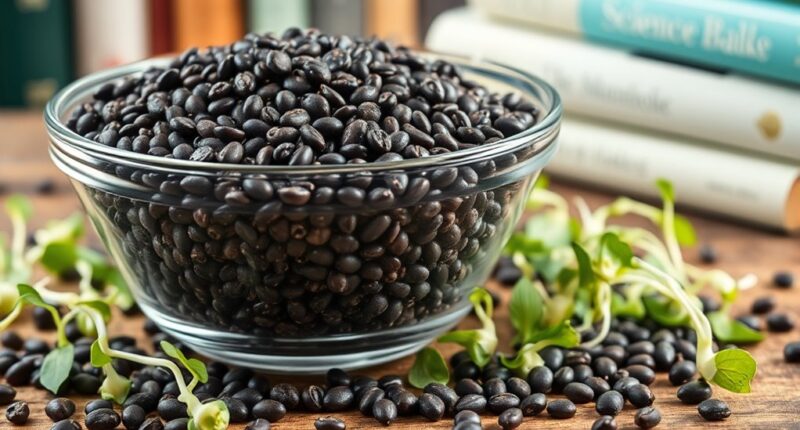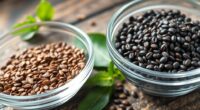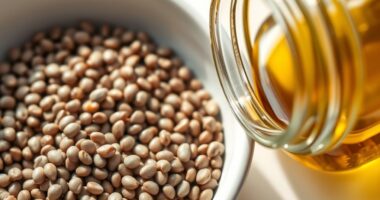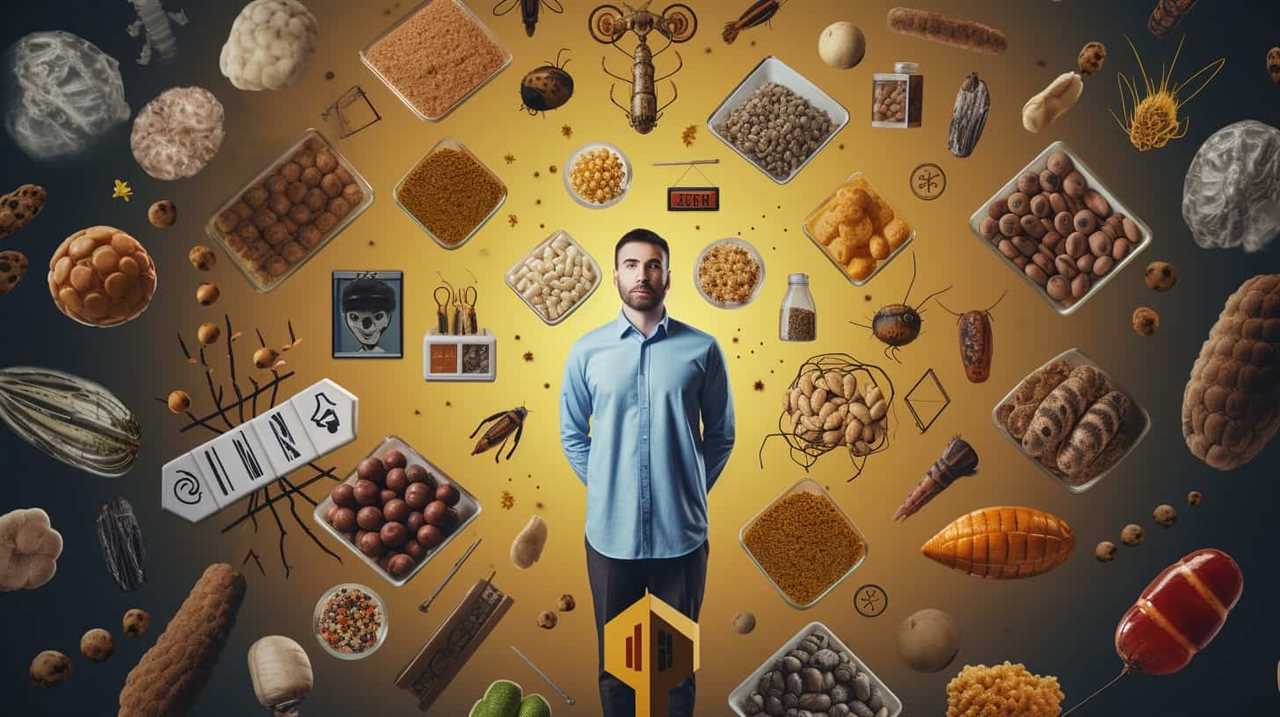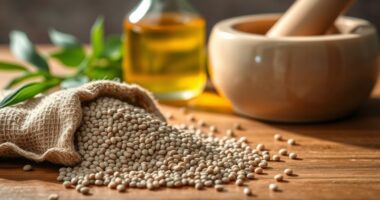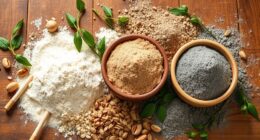Many myths about chia seeds, like them being a miracle weight-loss solution or a complete nutritional replacement, aren’t true. While they’re nutrient-dense and support a healthy diet, overuse can cause digestive issues, especially without proper hydration. Chia seeds are a helpful supplement but should be used wisely alongside a balanced diet. To uncover the truth behind these myths and learn how to incorporate them safely, keep exploring further.
Key Takeaways
- Chia seeds are nutritious but not a miracle weight loss solution; they support a healthy diet when used properly.
- Consuming chia seeds in moderation and with adequate hydration prevents digestive issues and health risks.
- They are a supplement, not a complete nutritional replacement; a balanced diet ensures all nutrient needs are met.
- Increased popularity can lead to overuse; moderation and proper preparation are key to safe consumption.
- Chia seeds complement a healthy diet but should not replace other nutrient sources for overall well-being.
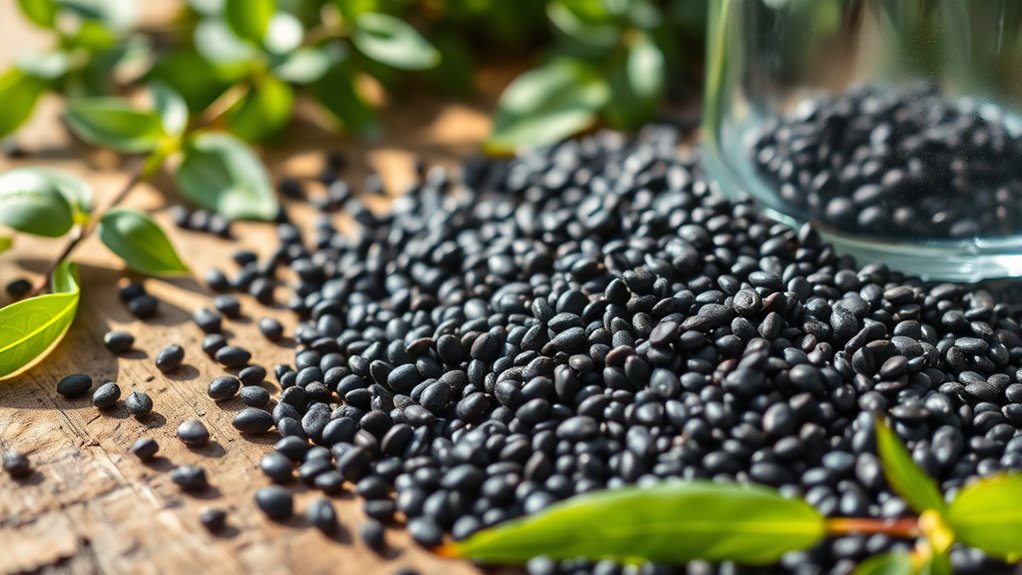
Chia seeds have gained popularity as a superfood, but many myths about their health benefits and risks persist. One common misconception is that they are a miracle cure for weight loss. While chia seeds are nutrient-dense and can support a healthy diet, they aren’t magic bullets. Their high nutrient density means you get a lot of essential nutrients—fiber, omega-3 fatty acids, protein, vitamins, and minerals—in a small serving. This makes them an excellent addition to your diet if you’re aiming for balanced nutrition, but relying solely on them won’t lead to significant weight management results. They can, however, help curb appetite because their soluble fiber absorbs water and expands in your stomach, creating a feeling of fullness. When you include chia seeds in your meals, they can help reduce overall calorie intake, which is beneficial for weight management, but they need to be part of a broader, healthy eating plan.
Another myth is that chia seeds are completely safe for everyone in unlimited quantities. While they are generally safe when consumed in moderation, some people should be cautious. Because of their high fiber content, eating large amounts of chia seeds without adequate hydration can cause digestive discomfort or even lead to an intestinal blockage in rare cases. It’s important to soak them before eating or include them with plenty of liquids to prevent choking or digestive issues. People with certain medical conditions or those taking blood-thinning medications should consult their healthcare provider before adding large amounts of chia seeds to their diets, as their omega-3s can have blood-thinning effects. Additionally, the popularity of chia seeds has grown significantly, leading to increased consumption and some concerns about overuse.
Some believe that chia seeds can replace all other sources of nutrition, but that’s not true. While they are nutrient-dense, they shouldn’t replace whole foods that provide a broader spectrum of nutrients. Instead, think of chia seeds as a supplement to a well-rounded diet, not a standalone superfood that can fulfill all your nutritional needs. Their versatility allows you to sprinkle them on yogurt, blend them into smoothies, or use them as an egg substitute in baking, making it easy to incorporate them into your everyday meals. But remember, no single food can deliver all the nutrients your body needs, and relying solely on chia seeds can lead to nutritional gaps.
Frequently Asked Questions
Are Chia Seeds Suitable for People With Nut Allergies?
If you have a nut allergy, you might wonder about seed safety, especially with chia seeds. Generally, chia seeds are safe for those with nut allergies because they aren’t nuts, but cross-contamination can occur during processing. To stay safe, always check labels and buy from reputable sources. If you’re unsure, consult your allergist before adding chia seeds to your diet, as individual sensitivities vary.
Can Chia Seeds Replace All Sources of Dietary Fiber?
Imagine someone relying solely on chia seeds for fiber substitution; they’d miss out on nutrient diversity. Chia seeds are a great source of dietary fiber, but they can’t replace all fiber sources. To maintain balanced nutrition, you should include a variety of fiber-rich foods like fruits, vegetables, and whole grains. Relying only on chia seeds limits nutrient intake and isn’t a sustainable, healthy fiber strategy.
Do Chia Seeds Have Any Significant Side Effects?
You might wonder if chia seeds have significant side effects. While they’re generally safe, they can cause gastrointestinal issues like bloating or discomfort if you eat too many or don’t hydrate properly. Allergic reactions are rare but possible, especially if you have a seed allergy. To avoid problems, start with small amounts, drink plenty of water, and monitor how your body responds.
Are Organic Chia Seeds More Nutritious Than Non-Organic?
You might wonder if organic chia seeds are more nutritious than non-organic ones. Organic farming often prioritizes soil health, which can boost nutrient density in the seeds. While both types provide essential omega-3s, fiber, and antioxidants, organic chia seeds may contain fewer pesticides and contaminants. Choosing organic supports sustainable farming and could offer slightly higher nutritional value, making them a better option for health-conscious consumers.
How Do Chia Seeds Compare to Other Superfoods Nutritionally?
Imagine a colorful fruit bowl, where chia seeds sit alongside blueberries and kale. Nutritional comparison shows chia seeds are rich in omega-3s, fiber, and protein, making them a top-tier superfood. While they excel in nutrient density, other superfoods like acai or spirulina offer unique benefits. Overall, chia seeds rank high in superfood ranking, but diversifying your intake guarantees a broader spectrum of health benefits.
Conclusion
Now that you’ve unraveled these chia seed myths, you’re like a savvy explorer charting new territory in your health journey. With each myth busted, these tiny seeds become your trusted allies, ready to boost your energy and nourish your body. Think of chia seeds as hidden gems, waiting to transform your diet from ordinary to extraordinary. So, go ahead—sprinkle them generously and embrace the vibrant, vibrant life that’s now within your grasp. Your health adventure just got a whole lot brighter.
